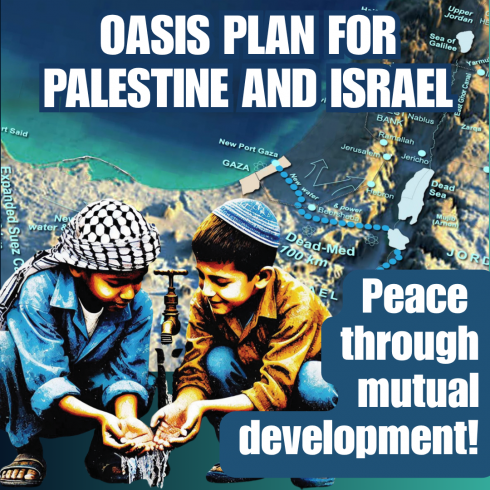The Schiller Institute issued the following statement on July 21 for the widest international circulation:
Download leaflet for distribution
On July 28–29, 2025, France and Saudi Arabia are convening a conference on a two-state solution for Israel and Palestine at the United Nations in New York.
This conference has to create the framework for peace among Palestinians and Israelis, this time by arriving at concrete initiatives in coherence with the humanist principles of the Abrahamic traditions (Islam, Judaism and Christianity), international law, and the UN Charter.
Today, in the real world, transmitted by the world media, mankind is assisting directly in a horrible spectacle: that of an Israeli government that is, in the name of the right to “defend itself against terrorism,” committing war against humanity, and barbaric acts akin to genocide. This government is kept artificially alive by the governments of Washington and London, via the injection of billions of dollars and increasingly lethal weapons.
In that context, recognizing and creating a Palestinian State is an absolute necessity. Giving it sovereignty over its water and energy resources will be one of the indispensable pillars to turn a dream—our proposal for an “Oasis Plan” of mutually beneficial development—into reality.
This perspective has to be adopted to the benefit of all participants of Southwest Asia who have to define its modalities and the means of its application.
As early as 1975, American statesman and economist Lyndon LaRouche had proposed the Oasis Plan to address the geological realities relevant to the people of Israel, Palestine and Jordan, who inhabit an arid region located at the connection of three continents. The essential developments of water infrastructure to make the deserts bloom, and transportation connectivity to allow the blossoming of trade and production, were central to his vision of economic development plans required for political solutions to be reached.
Such a plan is contrary to British geopolitics and colonial powers. The Oasis Plan approach defines a development perspective that goes, as it must do, beyond the plans of the World Bank, the French proposals, and those of the Arab League.
The plan takes inspiration from the Reconciliation Commission created by Nelson Mandela to overcome apartheid.
The Schiller Institute calls for:
• an immediate cease-fire;
• release of hostages and prisoners;
• immediate reinstatement of humanitarian aid and supply of water and electricity; and
• immediate recognition of a Palestinian state as a full member of the UN.
The Oasis Plan is the cornerstone for creating a new paradigm of “Detente, Entente, and Cooperation.”











